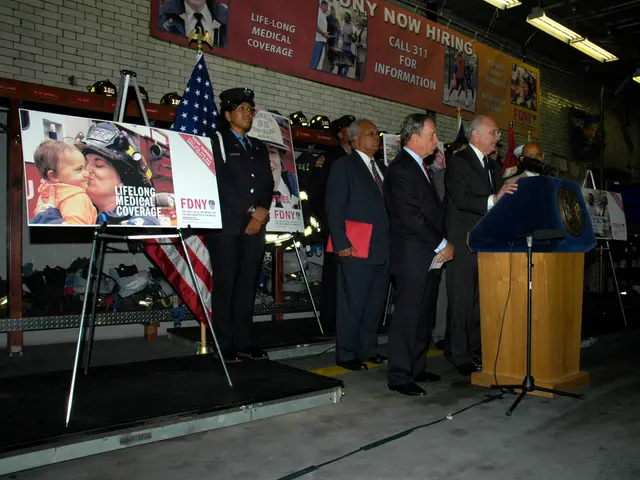Demand Swells to Close Border Mines Polluting the Kok and Mekong Rivers
Upstream mining operations in the Kok and Mekong Rivers, mainly managed by Chinese companies, have sparked concerns over long-term toxic effects on future generations. This news was raised by a coalition of civic groups and academics during a public gathering in Chiang Rai's Mueang District on May 24, 2025.
Lead by Niwat Roykaew, chairman of the Rak Chiang Khong conservation network, the event featured speeches and traditional rituals aimed at raising awareness about the increasing pollution in the region's rivers. The coalition called for immediate acknowledgement and action from the governments of Thailand, Myanmar, China, and the United Wa State Army to address the pollution in the Kok, Sai, and Mekong Rivers.
The contamination is believed to be due to gold, manganese, and rare earth mining activities upstream in Myanmar. Niwat stated that toxic runoff from these mining operations has already entered the major waterways, and if not addressed, the impact will intensify.
Participants performed Seub Chata rituals to honor and protect the Kok River, and ethnic groups from the region conducted spiritual ceremonies to reaffirm their commitment to safeguarding their waterways.
Pianporn Deetes, Campaign Director at International Rivers, stated that satellite imagery from GISTDA shows over 40 mining sites opened in Wa-controlled territory in the last two years. She added that these areas operate outside international environmental regulations and are a major source of river pollution.
Criticizing Chinese companies, Pianporn claimed that they secure mining concessions without consulting communities living downstream. She warned that toxic waste from these mines flows directly into the rivers and accumulates in the environment, threatening public health.
Suebsakun Kidnukorn from the School of Social Innovation at Mae Fah Luang University highlighted the economic and social toll of the worsening water pollution in the Kok, Sai, and Mekong Rivers. The contamination disrupted local livelihoods, raised costs for businesses, and impacted the fishing, hospitality, and restaurant industries.
While Thai authorities monitor water quality periodically, the root cause lies in upstream mining operations in Myanmar. As a response, local civil society groups are organizing a major demonstration on June 5 at 9am, with a symbolic march to the Kok River Bridge. Their aim is to show collective citizen resistance and submit a formal petition to the Chiang Rai Governor, urging the closure of the mines responsible for the environmental damage.
This issue necessitates urgent attention due to its transboundary nature. Regional mechanisms like ASEAN and the Mekong-Lancang Cooperation may offer diplomatic strategies to address the problem. However, as of now, there appears to be a lack of concrete responses or actions from the Myanmar, Chinese, and United Wa State authorities.
- The international stock market could be impacted if this environmental crisis in the Kok and Mekong Rivers persists, considering the region's significance to the global economy.
- Businesses that rely on renewable energy, such as solar, wind, or hydroelectric, have an opportunity to expand in the wake of this environmental concern, as clean energy solutions become increasingly essential.
- Environmental-science experts argue that climate-change mitigation efforts should prioritize the use of renewable energy sources in the industry, aiming to reduce carbon emissions and fight against pollution.
- Finance institutions are urged to consider the environmental and social risks associated with investing in mining or energy projects that fail to adhere to international standards for sustainability.
- The energy industry can lead the way in promoting energy efficiency, renewable energy, and environmental stewardship as part of its corporate social responsibility towards a sustainable lifestyle.
- The recent climate-change summit hosted by the United Nations called for investment in renewable energy and development of climate-change policies in various industries, including energy, finance, and business.
- Nurturing diversity-and-inclusion in the workplace is crucial for businesses to attract a broader range of perspectives and talents to address complex environmental challenges like this one.
- The increase in pollution in home-and-garden products, including detergents and fertilizers, is raised as a concern due to potential harmful impacts on both human health and the environment.
- While designing a sustainable-living space, considering budgeting for renewable energy implementation, energy efficiency improvements, and environment-friendly materials can significantly reduce its carbon footprint and overall costs in the long run.
- Education-and-self-development programs focused on personal-finance management and budgeting can help individuals make informed decisions about cost-effective solutions for sustainable living practices.
- Personal-growth initiatives promoting mindfulness, stress-reduction techniques, and emotional well-being may help individuals better cope with the stress and anxiety caused by negative news like this environmental crisis.
- Social-media platforms have a responsibility to censor and prevent the dissemination of misinformation related to environmental issues, such as the pollution in the Kok, Sai, and Mekong Rivers.
- Embracing a lifestyle centered on sustainable living, such as carpooling, reducing food waste, or using reusable containers, can help to minimize the individual's environmental footprint and contribute to solving global problems like this one.
- Entertainment and sports industries can leverage their influence by collaborating with environmental organizations and promoting environmental awareness and sustainable practices.
- Efforts to address policy-and-legislation regarding upstream mining and pollution control are critical for ensuring the protection of the environment and long-term public health.
- The sports-betting industry must prioritize ethical business practices, ensuring transparency and compliance with regulations, as well as supporting social causes like environmental conservation.
- Engaging in lifelong-learning opportunities is essential for staying informed about current global issues like this environmental crisis in the Kok, Sai, and Mekong Rivers, as well as for developing critical thinking and problem-solving skills necessary for finding viable solutions.








